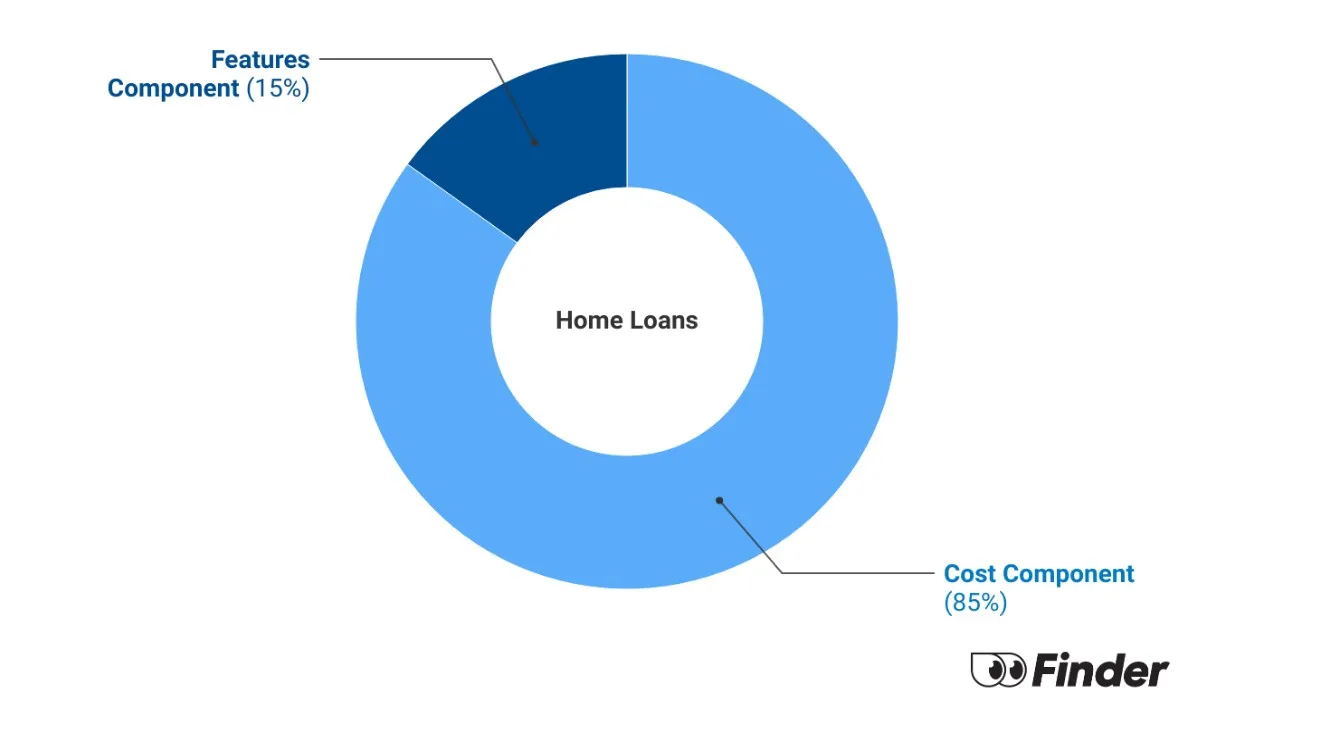To use Finder's simple equity calculator just enter an estimate of your property's current market value and how much is left on your home loan. You can also compare line of credit loans in the table below to start putting your equity to work.
How to calculate your equity
Calculating the equity in your home is easy. You just need to work out the difference between your property value and how much is left on your mortgage.
Property value - Remaining loan amount = Equity
Example: Your home is currently valued at $600,000. You have $200,000 left on your mortgage.
$600,000 minus $200,000 = $400,000 equity
Now, you won't know the exact value of your home until you actually sell it. But you can estimate the value of your home by looking at a property listing site and checking recent sales in your suburb.
Make sure you look at similar properties to yours to get a clearer estimate. If you own a 3-bedroom townhouse with a small garden and a 1-car garage, look at recent sales of other 3-bedroom townhouses with the same features.
If you want a more accurate estimate, you can use a professional valuer (which your lender will usually organise). You will also need to find out your loan balance by contacting your lender or checking your home loan statement.
What is useable equity?
Finder's equity calculator gives you 2 numbers: your total equity and your useable equity. Your total equity is the entire value of the property minus your debts. This is the amount of money you'd end up with after you sold your property (minus any real estate agent commission and other selling costs).
Useable equity is how much of your home's equity a lender will let you borrow. This matters if you're trying to borrow some extra money with a home loan top up or line of credit. Most lenders typically let you borrow around 80% of your home's equity instead of the full amount. But some lenders may be more conservative with this, restricting you to 70% of your total equity.
How to access your equity
Here are 3 simple ways via which you can access your home equity:
- Redraw. The simplest way to build your home equity is to make payments above your minimum monthly repayments. You can then access a portion of this equity by redrawing the extra funds. Redraw restrictions may apply depending on your lender. Learn more about mortgage redraw.
- Refinancing. If you refinance your home loan to a new one you can apply for a credit increase with your bank. When the new loan is approved, the extra money is added to your loan balance.
- Home equity loan/line of credit loan. A line of credit is a loan which extends you a set credit limit based on your equity. These loans allow you to withdraw small amounts or the whole balance whenever you like, and charge interest only on the amounts withdrawn.
What can I use my home equity for?
If you have equity in your property you can borrow some of this equity using a line of credit loan. Here are some things you can do using your home equity:
- Finance home renovations. You can use your home equity to fund some renovations to improve your place. You may also use the equity to apply for an additional loan and use the funds to purchase a new car or other investments.
- Fund a purchase or holiday. You can use your equity for any purpose, such as buying a car or taking a holiday.
- Building wealth. Unlocking the equity in your home can help you improve your lifestyle by enabling you to invest in property. Equity in your home can be used as security for property investment, enabling you to accumulate wealth.
Using your equity means paying interest and growing your debt
When calculating how much home equity you can access there are a few factors you should take into consideration:
- Increase in monthly interest. Accessing your home equity to get an additional loan or credit increase will increase the amount you owe. This will most likely end up increasing the amount you pay in monthly interest.
- Increase in monthly payments. Using your equity can increase your outstanding mortgage amount without increasing your loan repayment term. This will mean that your minimum monthly repayments can rise, so proper budgeting is required so as to avoid financial difficulties.
- Increase in your loan to value ratio (LVR). If your property value hasn’t increased significantly when you get a redraw or credit increase, your LVR may increase, forcing you to take out lenders mortgage insurance (LMI) that will further increase your loan amount.
What if I don't have much equity?
If you've just started making repayments on your loan you probably don't have much equity. As you repay the loan over time you'll build this equity.
Borrowers with low deposit home loans have the least equity. When you start a home loan, the deposit is the total amount of the property you actually own. So if you had a 10% deposit then you'd only have 10% equity at the start.
You can build equity by making extra repayments or putting extra money in an offset account. Over time, if property prices grow, this will also increase your equity. This is because while your home loan should shrink over time, any increase in the value of the home is entirely your money.
More helpful articles
- How to use your equity to buy a second property
- How to invest in property using equity and a line of credit
Compare line of credit home loans
What is Finder Score?
The Finder Score crunches 7,000 home loans across 120+ lenders. It takes into account the product's interest rate, fees and features, as well as the type of loan eg investor, variable, fixed rate - this gives you a simple score out of 10.
To provide a Score, we compare like-for-like loans. So if you're comparing the best home loans for cashback, you can see how each home loan stacks up against other home loans with the same borrower type, rate type and repayment type. We also take into consideration the amount of cashback offered when calculating the Score so you can tell if it's really worth it.
Read the full Finder Score breakdown
More guides on Finder
-
Home Loan rate rise calculator
Use our simple rate rise calculator to work out how much extra interest you have to pay when interest rates rise.
-
Capital gains tax calculator
Estimate your CGT when selling an investment property or other asset with Finder's simple capital gains tax calculator.
-
Comparison rate calculator
The comparison rate represents the actual cost of a home loan by taking into account its interest rate and any additional fees charged by the lender.
-
Home Loan Eligibility Calculator
Check out our home loan borrowing power calculator to see if you'll be able to afford the loan you want.
-
Interest-only home loan calculator
Estimate the cost of your repayments if you only pay the interest portion of your loan with an interest-only mortgage.
-
Calculate how long will it take to pay off my loan?
Wondering 'how long will it take to pay off my loan?' Use our free calculator to see how long it will take to pay off your mortgage.
-
Fortnightly payment calculator
With a fortnightly mortgage repayment instead of monthly, you could save thousands. Use our fortnightly payment calculator for home loans and save.
-
Offset calculator
An offset account calculator can help you estimate the savings of a 100% home loan offset. Calculate your savings and compare 100% offset home loans today.
-
Lump sum repayment calculator
Use a lump sum repayment calculator to see how much you can save in interest and fewer mortgage repayments. It's quick, free and easy to use.
Ask a question

